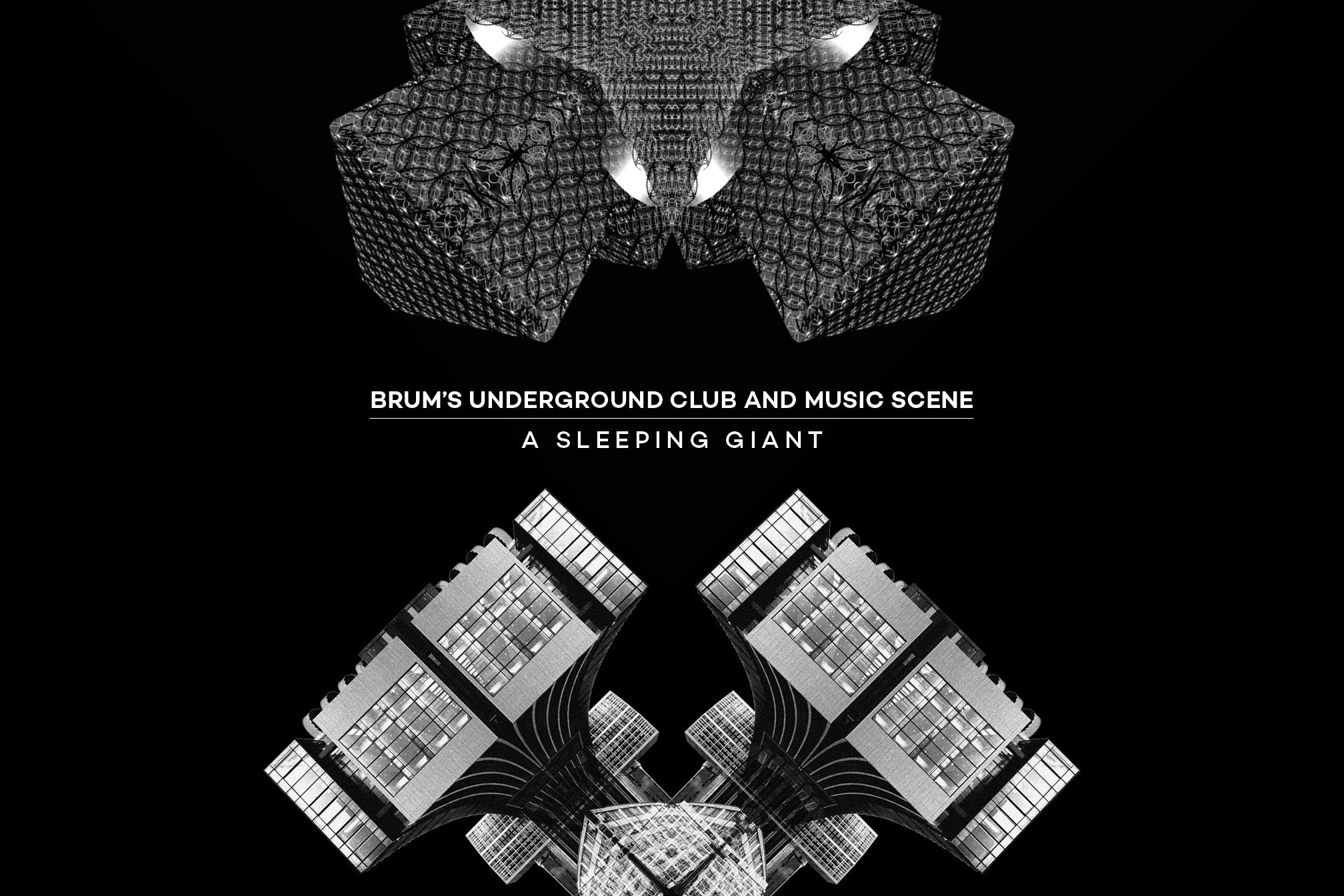 Scene reports
Scene reports
“Sleeping giant”: How Birmingham is building the underground scene it deserves
In Europe's youngest major city, fresh-faced passion is pushing the music scene towards new heights
Birmingham gets a bad rap. Search the internet and you’ll find endless memes rinsing the regional accent. It’s the hub of the Midlands, but its position in the country means it’s often overshadowed by northern and southern counterparts, as people skip between the two, overlooking what’s going on in the UK’s second city. But don’t believe the lack of hype, because a burgeoning underground music and club scene has been bubbling in Brum.
Most well documented is the city’s rap and grime scene, which has been flourishing for a while now with Brum-bred artists like Mist, Lady Leshurr, Jaykae and Lady Sanity propelling the sounds of the city onto national and international stages whilst repping B-town’s long-standing rap legacy. “Birmingham grime artists kept pushing that raw sound and set environment when others decided to chase the radio. So in my eyes, Birmingham kept the scene alive,” Franklin Armstrong, a respected local rapper, tells me of the significance of the city’s grime and rap scene.
Crews like Moorish Delta 7 helped established rap’s prominence in Birmingham, bringing 80s US hip hop-inspired sounds through. Later, The Streets emerged with their revolutionary ‘Original Pirate Material’, pushing things forward in a more UK-focused direction and putting Birmingham on the rap map with Brummie accented bars. Franklin's own story-telling style magpies influences from the early eras, while his unflinching, straight-talking lyricisms on tracks such as the Gruff-produced ‘Night One’ maintains a distinctive Brum flavour.

Beyond rap, Birmingham also has a proud rave legacy. An unpretentious and pioneering rave spirit sprouted across Digbeth's post-industry warehouses during the late 80s and 90s. Grassroots nights like Atomic Jam, Sensateria and House of God embraced the industrial, darker and faster sounds piercing Brum’s underground at the time and began uniting a community of ravers on its sticky dancefloors with whatever resources available. This DIY and community orientated approach may be the secret to the legendary House of God (which celebrated its 26th birthday this year) party’s enduring influence in Brum and beyond.
The same spirit prevails today in the current club and underground music scene that has been selflessly forged by a small network of forward-thinking local music lovers. Rich sounds and spaces that are heavily rooted in community and DIY are brewing beneath Brum's surface, and deserving of wider attention.
Record label and night Listening Sessions has been crucial in championing homegrown artists, cultivating collaboration and community among the next generation of local talent. Since starting in 2013, the collective has enabled producers across the electronic music spectrum to bench-test their tracks on mammoth sound systems, and acted as a support network and base for long-standing and new heads throughout the city, becoming a vital hub for those tapped into the underground.
Community has also paved the way for the continued growth of bass-heavy collectives like Sum Cellar, which has grown from the humble beginnings of throwing parties in ‘some cellar’ to packing out venues across the city, largely through word of mouth. The collective celebrated its 4th Birthday in April and continues selling out some of the city’s most iconic venues with a mixture of local DJs and national talent. Sum Cellar’s progress remains important in bridging national and international relationships with the local scene.
Another aspect that makes Birmingham’s music scene stand out is the manner in which it embraces and represents the wider city as a whole. Misfits, punks and outcasts have always found a home in the city, and this is reflected in its swelling sub scenes. From the new eclectic beat-making community Mystic Brew taking things from URL to IRL with new monthly nights to the queer-championing semi-regular classic house, pop and drag performance night Glitter Shit at The Nightingale Club, there is something for everyone. This stirs a feeling that Birmingham’s nightlife is on the brink of a cultural explosion.

But there is always space for more. Selextorhood, a monthly DJ workshop for female-identifying DJs and event started by Holly Hollister, is going to be crucial in aiding the promotion of womxn in Birmingham. Skilled selector and fellow Brummie Jossy Mitsu remembers: “When I still lived in Birmingham I sent a mix to a couple of promoters and they didn’t even reply to me let alone give me a chance to DJ!” Now based in London and a resident on the revered Rinse FM station, Jossy underscores the need for initiatives like Selextorhood outside the capital. “For people trying to break through, especially womxn, I think it can be harder in the smaller cities unless you get support from the more established promoters, which is why the work of people like Selextorhood is so important. There are a lot of workshops, panels and support networks to access these opportunities readily available in London, but there is such a big need and interest for it in Birmingham too. I‘m positive that will continue to grow, shout out Selextorhood!”
Franklin believes that the current success of Brum’s underground is also down to the “drive and determination to never compromise who we are or our sound” and “our ability to do it ourselves and be respected by our peers.” This sentiment is backed by grime platform BHX founder and A&R Muna Ruumi, who has done a lot to champion emerging talent from the city’s grime scene. “The local scene is so special because you can’t get a better night out in any other city...sorry not sorry,” she says. Its success is thanks to the passionate efforts of local music lovers in the city taking matters into their own hands. “Nights such as Leftfoot, Calm. Listening Sessions, TRPHSE, Mystic Brew, Sum Cellar and MOHO are crucial in continuing to inspire local artists and without them the underground scene would suffer hugely,” says self-taught hip hop producer Joe Corfield, who is an example of an artist thriving while still being based in Brum. His smooth and hypnotic frequencies that merge modern jazz with beat culture have reached beyond the Midlands to Brazil, LA and Chicago.
With that being said, it’s a bit of a bittersweet situation in the 0121 right now, as a lot of these nights have emerged as a result of bigger venues being shut down. “On the one hand, we’ve got nights and promoters growing month by month, giving opportunities to local artists while bringing stuff we’ve never seen to the city. On the other, we’ve had some of the biggest venues shut down and haven’t had much to replace them,” says Dylan Gray, a young Brum-based DJ and producer who is a testimony to the talent thriving in the city, already producing for the likes of Biig Piig, Black Josh and Bisk. His dreamy yet atmospheric lo-fi soundscapes can be very mood-based, “but the one constant is the inspiration the inner city gives” he tells me.
The closure of the city’s iconic Rainbow Venues last winter, which was renowned to the wider clubbing community for housing legendary Midlands parties across its 11-space complex, was a big blow to the city’s music and club landscape given the huge impact it had on ravers and DJ careers.
“I remember feeling so excited the first time I went to the Rainbow for nights like Shadow City, 2:31 FACE and EBL, this invite-only garage night where me and my one friend were probably the only people under 25 in there. It felt like what I’d imagine a proper 90s garage rave to be like – people were really dressed up in Moschino etc, popping bottles and just having a sick time," says Jossy of her early memories of Rainbow. "For the more underground nights I remember hearing bass-heavy experimental music on that sound system for the first time, and as a young Brummie girl that had just discovered mixing but didn’t know any DJs or producers, it was like nothing I’d ever heard out in my life. It made me really want to make the switch from vinyl to CDJs so I could do that too. That was the first time I’d seen people like Loefah, Oneman, Paleman and more that I’d heard on radio and I remember feeling like I wanted to experience more of it!”
“The significance of Rainbow being closed down is something I don’t think a lot of people fully realise yet. I can’t even put into words how amazing some of the nights there were - written words on a page couldn’t do it justice. Just know it was beautiful and a piece of me died when it closed,” Franklin reminisces.

And since Rainbow, there seems to have been an onslaught of sudden closures and licence suspensions that have threatened Birmingham's independent nightlife – Blackbox being the most recent casualty. A lot of these sudden closures run parallel with the expansion of the city’s business and office spaces, springing up at rapid speed across its backdrop and even eating into its underground.
“Gentrification,” Franklin affirms. “I’m like half joking, but seriously it feels like they are selling the soul of the city at the moment. Closing and destroying places that make the city what it is. It isn’t property developers or the council that continue to push Brum and change perceptions about it, it’s the people, it’s you and me.” This often leaves relationships with authorities tense, as Muna Ruumi has found trying to put on events in the city: “Especially the police, they’ve been blocking me from doing rap and grime nights for a while.”
Granted, the somewhat elusive and modest nature of the ‘city of a thousand trades’ when it comes to self-promotion doesn’t help make the case for Brum. But as Franklin explains: “That’s fine because everyone loves a surprise. Birmingham is the sleeping giant, constantly underestimated and doubted.” It is this local pride driving a new generation of artists, producers and collectives determined to stay and push the city forward despite a lack of big cultural incubators.
Tapping into the city’s breezy and carefree nature, Dylan values “the freedom to grow at your own pace and being able to work with raw talent before anyone else. It’s great to be part of such a dynamic scene." For Franklin, it’s that he “couldn’t imagine creating anywhere else.” Even a talent like Jossy who moved out of the city for University states: “I think I could definitely still have achieved a lot staying in Birmingham.” And as producer and one half of the Demtew DJ duo Gallah notes, the grass isn’t always greener. “Many people go to London expecting it to be like a cheat code, but you still have to graft,” he says. “There are just more platforms and that’s exactly what this city needs.”
A key thing Birmingham does have going for it is the time and energy to cultivate these platforms. With 40 per cent of the population under the age of 25, Birmingham currently stands as the youngest major city in Europe. This bounty of youth makes the city an inspiring environment that’s bursting with creative potential.

When I ask Gallah, whose sharp production cuts capture the raw and honest energy of Birmingham’s city life, what the best thing about making music in the city is, he tells me it’s the scene as a whole: “It’s slowly bringing creatives together to become a strong force.” Joe Corfield shares his view: “There’s a community of die-hard hip hop and beats heads in the city that will always come out to show support for underground events. This has created a family vibe in the city for me, which is something I’m really grateful for.”
Looking from the outside in, Jossy has witnessed this active growth. “It’s been great to see the ongoing success of nights like Sum Cellar, MOHO, Leftfoot and The Acid Experiment, as well as movements like Listening Sessions, and all the work people like Teefordaplug are doing to push boundaries,” she says. “One of the most exciting things I’ve seen pop up in Birmingham recently is the space•lab rave, which has booked a couple of huge and very well curated line-ups.”
It’s hard to keep up with the speed at which Brum’s underground community and scene is developing as new nights and venues continue to pop up, but the key now is sustaining the expansion and building on the vast potential of the city’s underground.
One thing that’s certain is Birmingham’s underground artists have a lot of faith in the scene’s future. For Gallah, the next step is unity among these various spaces and subcultures. “I’d like to see some unity in the city, we should be coming together,” he says. Franklin wants to see “a couple of decent radio stations and more live nights, where local artists can really get their music played and heard. Something different, something that will shift the culture”, he ponders, before adding in typically proactive fashion: “I should just put these on. You heard it here first, gotta be the change you want to see and all that.”
There’s a lot going on in Birmingham to shout about. As these scenes continue to mushroom Dylan is certain: “The next few years are going to see some huge stuff come out of 0121. That’s a fact.”
Geralda Cela is a freelance writer, follow her on Twitter
Read this next!
Mist has risen to prominence with an armful of UK rap bangers
Not just a London thing: Grime goes national
How DIY culture is transforming Leeds' music scene


